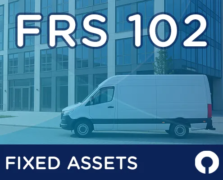IFRS 16 changes overview
The announcement of IFRS 16 saw the biggest change to Lease Accounting standards in the last 30 years. One year on, many companies have already started planning for the changes with some already working on early implementation in 2017. If you haven’t already started, now is the time.
What is changing?
The headline change is that the number of assets shown on the balance sheet will dramatically increase under IFRS 16. The primary objective of the changes is to give greater clarity around companies’ financial statements and make them more comparable.
Changes at a glance:
- Almost all operating leases will be accounted for as finance leases and need to be shown on the balance sheet.
- The new standard will significantly impact company ratios and measures including EBITDA, EBITA, EBITAR, cash flows, operating profit, net income, interest cover, gearing ratios and asset turnover.
- Small ticket and short term leases may be exempt.
- Lease categorisation will be based on Right of Use (ROU) rather than risk and reward.
- Some leases may need to be redefined as services and some services as leases depending on the terms of the agreement.
- IFRS 16 replaces IAS 17.
Who is affected?
Companies most impacted by the changes are likely to be lessees with lots of high ticket lease agreements. If you lease property, equipment, fleet or software, then the likelihood is that they will need to be reflected on the balance sheet from 2019 onwards.
There are some exceptions however:
- Lessors – Lessor accounting will remain largely unaffected by IFRS 16.
- Short term leases – If the lease duration is less than one year.
- Small ticket leases – leases that are below the suggested threshold of $5,000 and are not closely dependent on other leased assets.
- Services – IFRS 16 makes a distinction between lease agreements and service contracts. If the lessee has control over the use of an asset for a period of time, then generally it should be treated as a lease.
When are the changes effective?
The IFRS 16 standard is effective for annual reporting periods beginning on or after January 2019. Early adoption is permitted but only if the company applies IFRS 15 (Revenue from contracts with customers) alongside IFRS 16.
Leases that are currently subject to IAS 17, but stretch into the period post-IFRS implementation will be subject to retrospective reporting to demonstrate the changes to the balance sheet. Reporting is done in one of two ways:
- The full retrospective approach – Transition under the full retrospective approach requires companies to retrospectively apply the standard to each prior reporting period.
- The modified retrospective approach – In this case the lessee does not restate the comparative information but applies the standard from the start of the first annual reporting period under IFRS 16. The cumulative effect of adoption is then stated as an adjustment to the opening balance of equity as of 1 January 2019.
Where do I start?
According to a recent survey by Deloitte, the most common answer to this question is in collecting the relevant data on existing leases and organising them in a single central inventory. For companies using specialist Lease Accounting Software, this is likely to be a lot simpler than those with spreadsheet-based records.
The same survey also highlighted that over half of the companies had passed responsibility for the project to ‘controllership’ which seems logical. What might be less obvious is the need to involve other areas of the business, such as IT, early to prevent blockages further down the line.
Finally, more than half of companies surveyed expected to increase the amount of time they would be spending on lease accounting in 2017 and less than 2% expected this number to decrease. Ensure that you allocate enough resource to manage your leases effectively and look into ways to streamline the process.
IFRS16 Compliant Software
FMIS Lease Accounting Software can help to ensure that you are compliant with IFRS 16, GAAP and all relevant standards. If you would like to find out more about implementing the solution, please email us at sales@fmis.co.uk or call the offices on +44 (0) 1227 773003.







